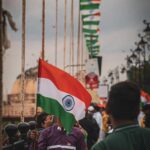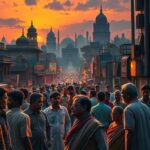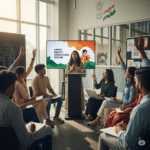New Delhi, India, 2025 — Democracy in India is more than a system of governance; it is a way of life that reflects the country’s pluralistic ethos and enduring commitment to liberty, equality, and justice. As the world’s largest democracy, India has demonstrated how democratic values can be seamlessly woven into everyday life, empowering citizens across its vast and diverse landscape.
This article delves into how democracy permeates Indian society, examining its influence on culture, governance, and grassroots participation.
A Democracy Rooted in Diversity
1. Cultural Pluralism and Democratic Values
India’s democracy thrives on its ability to embrace and celebrate diversity.
- Fact: The Census of India (2011) identifies over 2,000 ethnic groups, 22 official languages, and multiple religions, all coexisting under a single democratic framework.
- Impact: Articles 25 to 30 of the Constitution safeguard cultural and religious freedoms, enabling people to express their identities without fear of discrimination.
- Example: National celebrations of Diwali, Eid, Christmas, and Pongal exemplify India’s inclusive approach to its multicultural society.
2. Federal Structure for Representation
India’s federal system ensures that diverse regional aspirations find representation in governance.
- Fact: With 28 states and 8 union territories, India’s governance structure accommodates local languages, traditions, and priorities.
- Example: The recognition of regional languages in the Eighth Schedule of the Constitution promotes linguistic inclusivity in education and administration.
Democracy in Action: Grassroots Participation
1. Panchayati Raj and Local Governance
India’s democracy empowers citizens at the grassroots level through decentralized governance.
- Fact: Over 250,000 gram panchayats function as self-governing bodies, directly involving local populations in decision-making (Ministry of Panchayati Raj, 2024).
- Impact: Local governance bridges the gap between policy and people, fostering accountability and participation.
2. Voter Engagement
India’s vibrant electoral process reflects its commitment to participatory democracy.
- Fact: The 2024 General Elections recorded an all-time high voter turnout of 82%, with significant participation from rural and urban voters alike (Election Commission of India).
- Example: Initiatives like the National Electoral Literacy Campaign encourage informed voting, even in the most remote regions.
Challenges to Democracy as a Way of Life
1. Polarization and Rhetoric
Divisive narratives during elections challenge the unity and inclusivity that democracy upholds.
- Fact: The Election Commission of India (2024) flagged a 20% rise in communal rhetoric compared to 2019.
2. Socio-Economic Inequalities
Despite progress, economic disparities hinder equal participation.
- Fact: Oxfam India’s 2023 report revealed that the top 1% of Indians control 40.5% of wealth, while the bottom 50% holds just 3%.
3. Misinformation and Media Challenges
The rise of misinformation undermines democratic discourse.
- Fact: India ranks 150th in the World Press Freedom Index (2024), highlighting the need for greater protections for independent media.
Strengthening Democracy as a Way of Life
1. Promoting Civic Education
- Expand civic education programs to deepen understanding of democratic rights and responsibilities.
- Example: Integrating democratic studies into school curriculums fosters early awareness.
2. Bridging Socio-Economic Gaps
- Enhance welfare programs to ensure equitable access to resources and opportunities.
- Example: Expanding schemes like Ayushman Bharat ensures healthcare access for marginalized communities.
3. Protecting Democratic Institutions
- Strengthen safeguards for free press, judicial independence, and electoral integrity.
- Recommendation: Fast-track the Journalist Protection Bill to uphold media freedom.
Conclusion: Democracy as India’s Lifeblood
For India, democracy is not just a system; it is a way of life that permeates every aspect of its diverse society. From grassroots governance to cultural inclusivity, India’s democratic ethos fosters unity, participation, and resilience.
While challenges remain, the country’s unwavering commitment to democratic ideals ensures that its democracy continues to evolve, standing as a beacon of hope and inspiration for the world.



























